QuestionQUESTION: I have a 3 year old GTP who has a respiratory infection. I recently lost an amazon tree boa to a similar infection, and it was very fast. That night I checked him and he was active alert and breathing easily the next morning he could hardly breathe and died within a few minutes of being examined closely. I have called my closest reptile vet (an hour and a half away) and they cannot get me in until Monday morning. I have raised his overall temperatures and given him a warm basking spot as well as stripped his cage and sterilized his perches as well as removed the substrate and replaced it with paper towels. I was wondering if there were any temporary things I could do for him until I can get him to the vet? Anything that might help him breathe easier like vicks vapor does for people, or any other things I can do to help him? He is still active and alert but has excess mucus in his mouth and glottis and wheezes when breathing.
Thanks
ANSWER: The fact that you have two animals down with an RI in a relatively short period of time, and the RI comes on this quickly and severely, is a warning sign that you should not ignore. Quarantine the infected animal in a separate room, disinfect EVERYTHING with a strong bleach solution if it's come anywhere near those two animals, and vigilantly watch the rest of your collection. Practice paranoia-level handwashing, and do not transfer anything between any of the enclosures without disinfecting it. Do not transfer uneaten rodents to other snakes--you will have to discard them. (If they're alive, kill them and discard).
You may have a problem more serious than a bacterial RI. There is a remote possibility that what you have is paramyxovirus. If your ATB did not respond properly to the antibiotics, this may be the case. If you have access to a nebulizer, or can rent one, give him a couple of treatments a day with warm fog in a Rubbermaid bin. The fogging will help liquify the mucous so that the snake can expel it more easily. Hanging the animal upside down a couple times a day, to let the mucous drain can also help it out--snakes do not have a diaphragm, and cannot cough. Keeping humidity levels elevated will prevent thickening of the mucous, and help the snake stay hydrated.
Paramyxovirus is a dangerous snake virus that can wipe out most of your collection in no time, if not handled properly. Animals that have contracted the virus can sometimes be saved with aggressive treatment with antiobiotics over the course of several months (to control secondary infections), elevated temperatures (by as much as 10 degrees--hotter than you would normally keep the animal), and nebulizing. Symptoms include poor appetite during the incubation period, and sudden and very severe respiratory symptoms that do not fully respond to antibiotics, and can last for months. Animals will either very slowly recover, or will die suddenly. Severe weight loss can occur during the infection, and animals should be tube-fed to prevent emaciation. Some recovered animals will be asthmatic and susceptible to secondary infections forever. Occasional full recoveries are possible. It is not believed that fully recovered animals can harbor the virus, but whether you want to take that risk is up to you. If you believe you have this bug in your collection, quarantine it for at least a year. The incubation period for this virus can be up to 10 months. Nothing should come in or out until you're sure it's gone.
Most people quarantine for a mere 3 months--it's easy to see how an infected animal could pass through 2 different collections before it becomes symptomatic!
Diagnosis is VERY difficult. If you suspect paramyxo, paying for expensive tests is pointless--they are too imprecise to be worth the value. If you suspect it, treat for it.
Have your snake cultured to identify the bacterial culprit (if any). In the meantime, treat with a good antibiotic such as Fortaz, while waiting for the results. If this RI does not respond to the antibiotic recommended for the cultured organism, then assume what you have is paramyxo, and act accordingly.
If your snake dies before you can get it treated on Monday, refrigerate (not freeze) it, and have an autopsy done. If the culprit is paramyxovirus, the vet may find inclusion bodies (just as with IBD). This is an important step to take for the sake of the rest of your animals.
My fingers are crossed for you, and I hope what you have is simply an aggressive bacterial infection. You should still disinfect everything. Remember that bacterial respiratory infections are not usually very infectious, but paramyxo is highly infectious, similar to the common cold in its spread (not airborne, but contact).
Hopefully what you have is bad luck and a bad bacteria strain, and your snake will recover fully with antibiotic treatment. I haven't said all of this to frighten you, but because the consequences of not considering it could be so severe. Paramyxo and IBD are two of the biggest baddies out there when it comes to snake collections, and people tend not to talk about them, because breeders are afraid their reputation will suffer if they admit they've had either of them anywhere near their collection. I've done a lot of research into this when learning how to protect my own collection, and apparently this disease as not as rare as it should be! (I have stepped my own quarantine protocols up to 12 months). In reality, everyone should be quarantining for a full year...people are impatient to breed new animals, and take these huge risks. Newcomers to the hobby are told that 3 months is sufficient, and the problem continues to spread out there.
Your vet can give you a nebulizer antibiotic solution to put into the fogging treatments. Unless you have some F-10 disinfectant on hand, just use plain water until then.
http://www.smuggled.com/OPMV3F.htm
This article suggests asymptomatic carriers, but I've heard from another source that it is simply an extremely long incubation period in a few animals, and these carriers, which only show some loss of appetite, will eventually become symptomatic.
---------- FOLLOW-UP ----------
QUESTION: I appreciate your thorough response. The ATB that passed had been in my quarantine area for about 72hrs before he passed it was found to be a bacterial infection with him. The GTP was on the other side of my quarantine room and was scheduled to come out of quarantine next month, This little guy was a bit of a "rescue case" on my part, the previous owner had purchased him online and knew nothing about them. He was severely dehydrated and too small. Over the past 5 months he has been doing better, but he had an issue with a very mild RI when I got him. I figure this is just this coming back but since the ATB had a clean mouth 2 days before he died then suddenly died I am being extremely cautious. I will try the nebulizer and hanging upside down, I hadn't heard of either of these and appreciate having something I can do besides worry that may help the little guy out. I love this little guy to death, when you work with one all the time its hard not to I suppose. I have quarantined him away from everything and raised his temperatures as well as sanitized the tub he is in. I appreciate the extra reading and will definitely keep my eye on everyone, hopefully my collection shouldn't be in great danger as it is kept well separate from the quarantined animals and I have three sets of tools none of which cross into the other areas. I appreciate the depth and thought put into your response.
Thank you again
AnswerI'm relieved to hear there's evidence of other causes, and they're all in quarantine still. Hopefully the two are completely unrelated, and the little guy rallies for you and does great!
Yeah, the F-10 disinfectant is becoming the 'new thing' in the herp world...BHB swears by it for treating mild respiratory infections, used diluted as a nebulizer solution. Regular nebulizing does help.
(I've dealt with a few bacterial RIs over the years).
Just watch out when you get the snake to hang head-down, as you may get nothing, or you may get a big splat of mucous, which you probably don't want on the floor or your pants, lol.

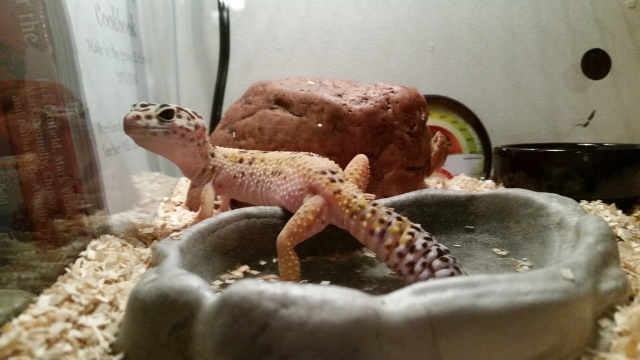 Leopard gecko possibly pregnant
QuestionQUESTION: Hello!
About a week ago I adopted a 2
Leopard gecko possibly pregnant
QuestionQUESTION: Hello!
About a week ago I adopted a 2
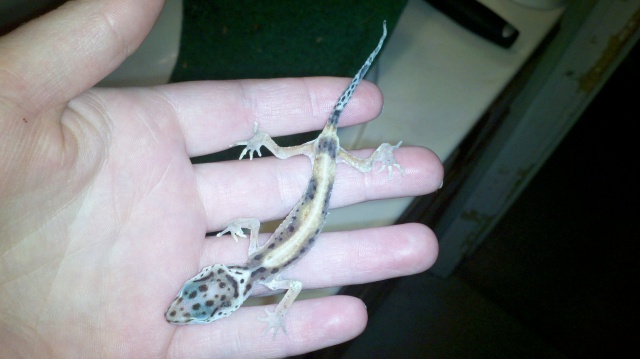 leo weight loss...
Question
Slinkz
My friend has a leopard gecko roughly 3
leo weight loss...
Question
Slinkz
My friend has a leopard gecko roughly 3
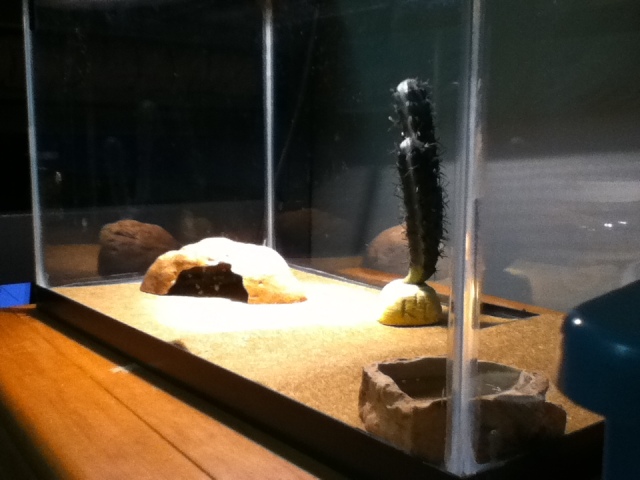 Lizard habitat
Question
Lizard cage
My old leopard gecko died.
Lizard habitat
Question
Lizard cage
My old leopard gecko died.
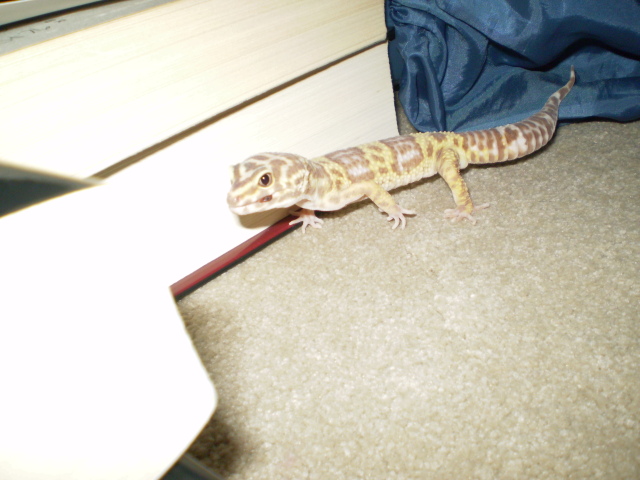 Leopard Gecko abscess
QuestionLeo Scab
QUESTION: Hello :)
I have had m
Leopard Gecko abscess
QuestionLeo Scab
QUESTION: Hello :)
I have had m
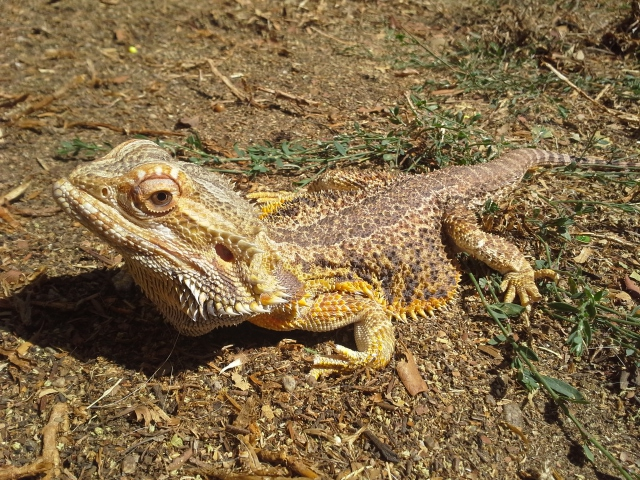 My bearded dragons hands are bent sideways?
QuestionHaro, My bearded drago
QUESTION: Hello,
My bearded dragons hands are bent sideways?
QuestionHaro, My bearded drago
QUESTION: Hello,